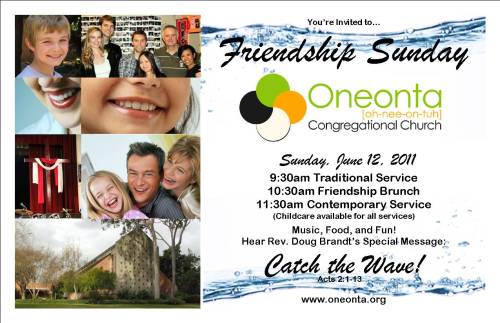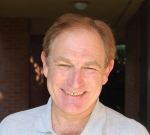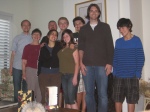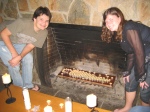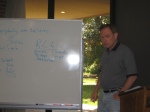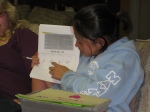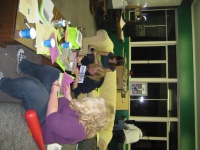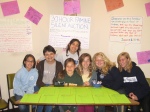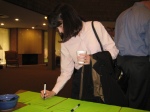Posts Tagged ‘Spiritual Growth’
Oneonta hosts “Friendship Sunday” on June 12, 2011! All are invited!
Posted in Contemporary Worship (ONE Worship), Music Ministry, Oneonta Congregational Church, Traditional Worship Service, tagged Christian, Church, Churches in South Pasadena, Contemporary Worship (ONE Worship), Contemporary Worship Service, fellowship, friendship, fun, Jesus Christ, Oneonta Congregational Church, Rev. Doug Brandt, South Pasadena, spiritual formation, Spiritual Growth, Traditional Worship Service on May 26, 2011| Leave a Comment »
Celebrate Easter Sunday at ONE Worship, April 24 @ 11:30am
Posted in Contemporary Worship (ONE Worship), Oneonta Congregational Church, tagged Bible, christianity, Church, Churches in South Pasadena, Contemporary Worship (ONE Worship), Contemporary Worship Service, Easter Sunday, Jesus Christ, ONE Worship, Oneonta Congregational Church, Rev. Doug Brandt, South Pasadena, Spiritual Growth on April 13, 2011| Leave a Comment »
Spiritual Formation update
Posted in Oneonta Congregational Church, Small Groups, tagged Bernice Worley, Churches in South Pasadena, Oneonta Congregational Church, Small Groups, spiritual formation, Spiritual Growth on November 25, 2009| Leave a Comment »
| Last Monday the Spiritual Formation Group studied spiritual disciplines in the context of corporate worship and the church as a body of Christ. We explored what makes up a “community” and discussed Oneonta’s “OASIS” community (OASIS is an acronym of Oneonta’s framework: Outreach, Acceptance, Service, Inter-relational, and Spiritual Growth).
The group read about Moses’ response to his encounter with God in the burning bush (Exodus 3:1-6) and Isaiah’s personal encounter with God (Isaiah 6:1-8). We also looked at Jesus’ teaching against hypocrisy and how to tithe, pray and fast (Matthew 6:1-18), as well as His discussion with the Samaritan woman at the well about the location of worship not being the issue; but the heart and mind are where worship counts. (John 4:19-24). We will continue this study of spiritual discipline within community next week on Monday, November 30th, from 7:00-8:30 p.m. in the Tower Room, when we look at what Paul wrote to the early church communities in Corinth and Philippi about spiritual formation. Count your blessings this Thanksgiving! Bernice Worley |
Lectio Divina with Spiritual Formation Small Group
Posted in Oneonta Congregational Church, Small Groups, tagged Bernice Worley, Churches in South Pasadena, lectio divina, Oneonta Congregational Church, spiritual formation, Spiritual Growth on November 13, 2009| Leave a Comment »
Last Monday, the Spiritual Formation Group explored the spiritual discipline of lectio divina (divine reading) – the slow, contemplative reading and praying of the Scriptures. Here are the four steps to practice lectio divina:
(1) “Lectio” or reading or sensing – take about 5 minutes to read a short passage of Scripture through slowly and reverently, allowing God to speak to you through his Word about how you can be obedient to His will for your life.
(2) “Meditatio” or reflection/meditation or thinking – take about 10 minutes to read the passage again and think carefully about it, asking yourself questions and considering all possible meanings. What does it say? What does it mean? How does it apply in my life?
(3) “Oratio” or prayer or intuiting – take about 5 minutes to pray about the passage of Scripture. Remember that prayer is a dialogue with God, so pour out your heart, but take time also to listen to God — “God, what are you saying to me today?” — and wait for his Spirit to show you, through the Word, what he wants you to know.
(4) “Contemplatio” or contemplation or feeling – Note the distinction between contemplation and meditation. Meditation is focusing on the Scripture’s meaning while contemplation is focusing on how to put God’s Word into action in your life. Take 5 minutes to contemplate on the passage of Scripture.
The group experienced Psalm 15 through lectio divina and had a variety of individual insights to share with each other. On Monday, November 16, the Spiritual Formation Group will meet in the Tower Room from 7:00-8:30 p.m. to study how God began the spiritual formation in the life of Saul, the first king of Israel (read 1 Samuel 9:1 – 10:13 in advance).
Bernice Worley
Spiritual Formation Small Group Update
Posted in Oneonta Congregational Church, Small Groups, tagged Churches in South Pasadena, Oneonta Congregational Church, Small Groups, spiritual formation, Spiritual Growth on November 5, 2009| Leave a Comment »
The Spiritual Formation Group will meet in Redwood Chapel on Monday, Nov. 9th, from 7:00-8:30 p.m.
Another group needs the space in the Tower Room for this one week, so we’ll enjoy a different location as we explore Lectio Divina (Latin for divine reading), a centuries-old method of reading Scripture to experience transformation.
Last Monday, the group discussed the benefit of fasting in today’s world. It is the disciplined person who can do what needs to be done when it needs to be done – i.e., there is a time to feast and a time to fast. There’s a long list of Biblical fasters that reads like a who’s who of Scripture, as well as many well known Christians throughout church history. In His sermon on the mount, Jesus gave explicit instructions of what not to do and what to do when fasting – note that he referred to when we fast, not if we fast (Matthew 6:16-24). Fasting is a way of humbling oneself before God and helps one to focus on a specific issue. Oneonta’s youth group can testify to this from their experience of World Vision’s 30 Hour Famine.
The central idea in fasting is the voluntary denial of an otherwise normal function (whether it’s eating or something else) for the sake of intense spiritual activity.
The group briefly discussed how fasting from people (making time for solitude), the phone and conversation (making time for silence) and consumerism can foster spiritual growth in an ever busy, noisy world. What do you need to fast from to grow closer to God?
-Bernice Worley
Spiritual Formation small group update
Posted in Oneonta Congregational Church, Small Groups, tagged Churches in South Pasadena, Oneonta Congregational Church, South Pasadena, spiritual formation, Spiritual Growth on October 29, 2009| Leave a Comment »
| The Spiritual Formation Group read and discussed Elijah’s encounter with God in the cave on Mount Horeb (1 Kings 19:8-18). “A hurricane ripped through the mountains and shattered the rocks, but God wasn’t to be found in the wind; after the wind an earthquake, but God wasn’t to be found in the earthquake; and after the earthquake came fire, but God wasn’t to be found in the fire; and after the fire, a gentle, quiet whisper.” Like Elijah, in the quiet we can begin to hear the still, small voice of God.
David had a lot to say about being still and waiting for the Lord. “I wait for the Lord, my soul waits, and in His word I put my hope” (Psalm 130:5). “My soul waits in silence for God only; from Him is my salvation” (Psalm 62:1). “Be still and know that I am God” (Psalm 46:10). The more hectic our lives, the more essential it is that we make space for silence and solitude. Hans Margolis said, “Only in quiet waters do things mirror themselves undistorted. Only in a quiet mind is adequate perception of the world.” Silence and solitude supply fuel for the soul. There’s something about being alone and quiet that has the ability to renew, invigorate and energize us. But it’s not just about being alone and quiet – it’s about being alone with God, and quiet so we can hear Him speak. Try these three simple steps to take toward hearing God’s still, small voice: (1) Find time to be alone; (2) Make it as quiet as possible; and (3) Practice the art of silence, which involves active listening. Next Monday evening the group will discuss the Biblical tradition of fasting – how do we practice this in the 21st century? What are the benefits of exercising this spiritual discipline? -Bernice |
Oneonta’s Monday Evening Spiritual Formation Group
Posted in Oneonta Congregational Church, Small Groups, tagged Christian, Church, Churches in South Pasadena, Devotional, fellowship, Oneonta Congregational Church, South Pasadena, spiritual formation, Spiritual Growth on October 26, 2009| Leave a Comment »
| What does it mean to imitate Christ? Arthur Simon, founder of the international organization Bread for the World, grew up on a farm in Wisconsin and was taught by his father that “even the cows should know you are a Christian by the way you treat them.” Last Monday, the Spiritual Formation Group studied the pattern of Jesus’ life and ministry as set forth in Mark 1:35-42. In a nutshell, Jesus set an example of meditation, proclamation and compassion.
Meditation (or spending quiet time alone with God) is necessary to face the challenges with which we are presented. As a medieval monk prayed, “Lord, temper with tranquility our manifold activity, that we may do our work for thee with very great simplicity.” Proclamation (or preaching) was essential to Jesus’ ministry. All Christian living is proclamation of that which masters us. By deed as well as by word, we make a statement about the things in which we believe and an expression of our faith. Compassion (or love) is a natural blossom from the seed planted in meditation; and proclamation is futile without compassion. As Johann Wolfgang von Goethe so aptly stated, “The highest cannot be spoken, it can only be acted” and “Knowing is not enough; we must apply. Willing is not enough, we must do.” May the example that Christ gives us draw us to a fuller commitment of our lives to His way so that even the cows will know we are Christians! Next week the Spiritual Formation Group will explore the disciplines of silence and solitude and how they provide perspective and fuel for the soul. -Bernice Worley |
Spiritual Formation small group update
Posted in Small Groups, tagged Small Groups, spiritual formation, Spiritual Growth on October 2, 2009| Leave a Comment »
| The Spiritual Formation Group met last Monday to discuss different aspects of finding the secret of satisfaction by seeking God’s kingdom. In Matthew 5:6, Jesus tells us we are blessed when we ravenously hunger and insatiably thirst for righteousness, and he assures us that we will be filled or satisfied. We talked about righteousness being a gift from God and sanctification as a process of becoming more Christ-like through the power of the Holy Spirit. In John 6:35, Jesus said “I am the bread of life. He who comes to me will never go hungry, and he who believes in me will never be thirsty.” So the way to satisfaction lies in coming to Jesus and believing in Him.
Next Monday from 7:00-8:30 p.m. in the Tower Room, the group will explore the mysterious partnership we forge with God in our quest for holiness – this process of spiritual growth – is it our job or God’s? Bernice Worley |
Confirmation Retreat 2009!
Posted in Youth Ministry, tagged Bible, Christian, Churches in South Pasadena, confirmation, New Testament, Oneonta Congregational Church, South Pasadena, Spiritual Growth on April 28, 2009| Leave a Comment »
Check out our ONE Worship ad in the South Pasadena Review
Posted in Contemporary Worship (ONE Worship), Oneonta Congregational Church, tagged Churches in South Pasadena, Contemporary Worship (ONE Worship), Contemporary Worship Service, ONE Worship, South Pasadena, South Pasadena Review, Spiritual Growth on April 28, 2009| Leave a Comment »
ONE Worship Palm Sunday 4/5/09 recap
Posted in Contemporary Worship (ONE Worship), Oneonta Congregational Church, Staff Blog, tagged Churches in South Pasadena, Contemporary Worship (ONE Worship), Contemporary Worship Service, Jesus Christ, Oneonta Congregational Church, Spiritual Growth on April 7, 2009| Leave a Comment »
We had another great ONE Worship event last Sunday! Our celebration of Palm Sunday included lots of singing, smiling, and waving of palms. I showed a video clip from “LOTR: Return of the King” and we talked about Jesus’ role as King.
Here is a summary of my message:
Palm Sunday is a special time for us to remember the day that Jesus was welcomed as a King when he entered Jerusalem. A huge crowd of people gathered to see the One who had performed miracles and astounded people with His teachings about God, love, and the Jewish Law.
The Gospel writers used many symbols to illustrate Jesus’ identity and message. The people laid palm leaves, a symbol of triumph and victory, on the ground before Jesus. They cried “Hosanna”, which is a Hebrew word, meaning “save”, to Jesus as He passed them by. Jesus rode upon a donkey, a symbol of grace and peace, fulfilling the prophesy made concerning the Messiah in Zechariah 9:9-10.
Jesus, the Son of God and Lord of all, could easily come into our lives as a conquering and all powerful overlord. This would enable Him to gain the obedience of all people. BUT… this would not win their hearts. Jesus is more interested in being the king of our hearts than the king of our government. His humble entrance into Jerusalem signifies His greater mission, for Him to enter as King of our hearts.
Question to ponder for Holy Week:
- How has God put me first? How has he won my heart?
- How can I put Him first? How can I give him mine?
-lincoln
The Home of the Puritans Loses its Religion (Part 1)
Posted in Oneonta Congregational Church, Staff Blog, tagged American Religious Identification Survey, Bible, Christian, Church, Churches in South Pasadena, Devotional, Jesus Christ, Joanna Lin, John Cotton, Los Angeles Times, Oneonta Congregational Church, Puritans, Religion, Rev. Doug Brandt, Spiritual Growth, USA Today on March 16, 2009| Leave a Comment »
“My food,” said Jesus, “is to do the will of him who sent me and to finish his work. Do you not say, ‘Four months more and then the harvest’? I tell you, open your eyes and look at the fields! They are ripe for harvest. (John 4:34-36 NIV)
First the bad news, John Cotton would not be happy! Does it frighten me? No!
I have taken my title from a Los Angeles Times article dated Monday, March 16, 2009. The article by Joanna Lin reports the findings of the American Religious Identification Survey 2008. The upshot of the article is the number of Americans claiming no religion has nearly doubled. Of interest was that the New England region of the United States has surpassed the West Coast in its abandonment of religion! The cradle of Pilgrim congregationalism and the new frontier for it are fast becoming spiritually nonaligned. I thought to myself, “Hey they are talking about us!” “They have us going and coming.
While the Los Angeles Times article was on page four, a similar article appeared on the front page of USA Today seven days ago. I believe the title of the article was “‘Nones’ Now 15% of the Population.” It looks like since 1990 the number of people who claim ‘no religion’ has grown from 8% to 15%! That means if the present trends continue for the next 60 years, 57% of all Americans will be claiming no religion!
Now the good news – this is nothing new – and it actually presents the church of today with an unprecedented opportunity. It is often the case that the solution to a problem is bound up in the problem itself.
The bad news provides an answer. In USA Today, Kathy Lynn Grossman quotes Barry Kosmin as saying: “These people aren’t secularized. They’re not thinking about religion and rejecting it; they’re not thinking about it at all …” Do you see the solution? The solution is to reach out to the people around us and introduce them to Christ. If Kosmin is right, these are people who are neutral about religion.
When Jesus’ disciples demurred at his offer of the Gospel to the Samaritan woman and her Samaritan friends, he told them the fields were ripe for the harvest, all they had to do was look around them. In Matthew Jesus said, “The harvest is plentiful, but the laborers are few!” In both cases he is telling his disciples: reach out to those around you and you will have success!
If the statistics of the American Religious Identification Survey are correct, that means that within a five mile radius of Oneonta there are 198,000 people who don’t have religion on their radar. That’s a harvest field ripe for the picking.
We think of Lent as a time of introspection. Perhaps the church of the 21st century should use times like Lent to be extroverted. Do you think Oneonta can lead the way?
Your Pastor and Friend,
Doug Brandt

Pastor Doug
